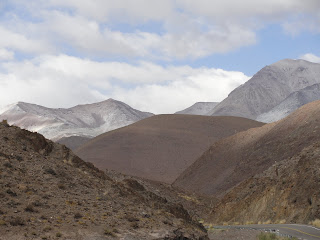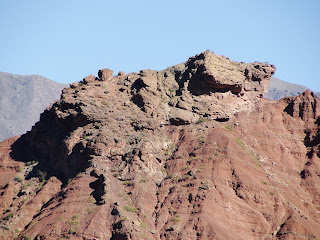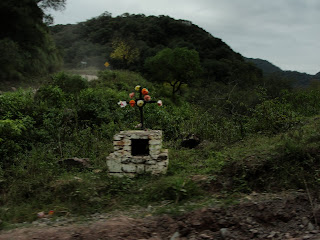Wednesday, May 19, 2010
Tuesday, May 18, 2010
A great end to the Salta adventura.
It's Grand Canyon-esque, only with a big rock formation that looks like the Titanic. There is an amazing 120m tall ampitheater formed from a giant whirlpool of water millions of years ago, and another huge cavern named "the throat of the devil" in Spanish (I forgot to ask why exactly)...
looking out from inside the ampitheater
... as well as parrot caves (parrot holes/nests in the rock that we misunderstood as "pirate" caves - those would have to be some tiny pirates).
In Cafayate we visited a modern winery and sampled their red and white varietals.
Bodega Domingo Hermanos
salud!
We tried local potato wine in an artisan shop, had lunch downtown (where I "sampled" a half-liter of their red house wine) and visited the oldest winery for another tour and tasting. The guy at Vasija Secreta gave the tour in Spanish and my bodega vocabulary is a bit limited but I was able to gather that he clearly thought their winery and wine was superior to any other.
wine aht
Cafayate felt very familiar - it was what a smaller-scale Napa would look like if it were surrounded by gorgeous cavernous mountains, right down to mountain bikers careening up the road causing traffic jams.
During the three hour drive back a group of local tourists sitting behind us talked constantly and at a very loud volume. (My ears were actually ringing afterward.) I was struck by the difference in temperament between the residents of places I had visited in Peru and Ecuador, and that of those particular Argentinians riding behind me. I'm not generalizing by any means - just observing. Mi familia in Ecuador was pretty talkative but this was a different vibe, a livelier vibe.
As more evidence, early one morning Kim and I saw large groups of people wandering home from partying the night before. I have seen lots of people having fun on this trip but I don't recall seeing that type of vibe since Buenos Aires in February.
I also realized that when I started in Buenos Aires I had no trouble adjusting (other than the heat and slow walking pace) but coming to Salta after spending basically a month in sleepy cobblestone areas and/or farmland and/or intense nature was kind of a culture shock. I am slipping back into reliance on Internet, access to everything imaginable and comfort with big cities. Full circle might be the best end to this trip.
Interestingly, I have noticed that my walking pace has slowed considerably compared to my recent west coast traveling companions. And a while back I realized that I stopped making all my lists. South America acclimation, phase three must be complete... just in time to go home. I need another year here.
In other news, I highly recommend these guys should you find yourself in Salta and needing a tour guide. Fun, friendly and fairly inexpensive. Thanks, Monica and Sergio!
Monday, May 17, 2010
The soundtrack for the Salta portion of the program will include "El Condor Pasa."

 On the way back to Salta we stopped numerous times (and heard numerous versions of the aforementioned song). First was Tilcara, home of some of Argentina's pre-Incan ruins. The differences between these and Peru's pre-Incan ruins were interesting. Tilcara's have been completely rebuilt, there is a pyramid-shaped monument to the archaeologist(s?) at the top of the hill, and there are no terraces and cactus everywhere.
On the way back to Salta we stopped numerous times (and heard numerous versions of the aforementioned song). First was Tilcara, home of some of Argentina's pre-Incan ruins. The differences between these and Peru's pre-Incan ruins were interesting. Tilcara's have been completely rebuilt, there is a pyramid-shaped monument to the archaeologist(s?) at the top of the hill, and there are no terraces and cactus everywhere.weird, bordering on offensive and inappropriate
The building concepts were the same, of course - stone-on-stone structures (although in this case cane and cactus were also used), trapezoidal doors, and my favorite, the wall niches. Interesting site.
cane, cactus and mud were used to reinforce the stone structures
We also stopped by Tilcara's main plaza, where - of course - the locals were selling handcrafted wares to tourists, and I visited the archaeological museum. Interesting artifacts, but more interesting was the empty display case where a sign had been posted: "we had a mummy on display here, but out of respect for the dead we decided to remove this display." (Implied but not stated: Phhhhhhbht, Salta.)
Tilcara main plaza, and the only woman I saw honored in this way in South America
The rest of the day was a blur of car-badAndeanflutecovermusic-stop-car-dust-wind-car-badAndeanflutecovermusic. Basically:
Next was Humahuaca and a 400 year old cathedral with a confessional made of cactus wood. So cool! There was also a monument to those who helped Humahuaca gain independence, and a clock tower of adobe.
And some other things I didn't quite follow (our town guide only spoke Spanish and I was pretty windblown and tired by this point). We skipped the tourist trap lunch of meat and "squished" potatoes and dined in a really cute cafe instead...inside El Portillo
quinoa crepes are wonderful - who knew?
a novel and natural way to store wine
... then braved the wind for more photo ops.
view from the independence monument
In Uquia we saw another small but beautiful 400 year old church with a similar cactus confessional.
Interestingly, the exteriors of the churches the day before were painted to look like cobblestones, but the ones we saw the second day were the usual pristine white (like Cachi's). Our guide's presence was rather underwhelming for this portion of the Salta program and I forgot to ask about the difference.
Quick stops at the Tropic of Capricorn...
(where I thought we were looking at a beautiful cemetery but I was actually supposed to be looking at the mountain)
... and Jujuy ("hoo-hoooey")...
 Jujuy: allegedly home of the most beautiful people in Argentina
Jujuy: allegedly home of the most beautiful people in Argentina pretty churches, I know that for sure
pretty churches, I know that for sure... and back to Salta to rest up for the next day's adventure: wine country!
Sunday, May 16, 2010
And two months ago I was worried about not seeing a cloud forest... Ha.
The first part of the trek followed the Tren a las Nubles, a scenic tourist train through the clouds that only runs twice a week. This was not one of those days. Following the train tracks in the 4WD was just as fun, if not more so.
our tour bus for the day
breakfast! I think I ate 19 of those little croissants... so yummy
It was bloody cold and the clouds didn't lift until about 10am, but the views were still amazing. We passed Abra del Acay, a gorgeous ~5,000m black mountain with white peaks, and San Antonio de los Cobres at 3,800m.


town church
mmmmm - mate!
For lunch we stopped at a farm off the main road. A family of about 30 lives there and has built the living structures out of local material including the cactus we had been seeing and slabs of compressed salt.
the restaurant - 100% natural, except for the Coca-Cola
almost made me wish I had a job... almost
Really beautiful buildings and furniture. They also had a small museum about the puna area. Lunch was empenadas (always yum!) and a stew of pasta and meat.

The winds and dust from the day before were present here too, and exploring around the farm was interesting but not at all pleasant weather-wise.
the family church
heating water the natural way
no town in South America -and I mean NO town - is complete without a soccer field
one of these things just doesn't belong
Next was Salinas Grandes, 300 square kilometers of salt flats 30-50cm thick, formed from volcanic eruptions eons ago. There were lines cleared for trucks that looked like pavement and it was only after close investigation that we realized we were standing on salt, not asphalt.
no, really, it's salt
Amazing. It was indeed otherworldly and created a complete loss of perspective.
really, it is
We took some photos on salt dunes and started to walk out to a small building only to realize it was a bazillion miles away in actuality...

After that we went through more cloud forests and beautiful scenery...
the highest point we would cross that day
... to our overnight stop, Purmamarca, home of the Cerro de Siete Colores (a mountain with striations of colors that really glow in the evening and morning). Our hotel room overlooked the mountain and featured a bathtub, an amazing shower and electrical outlets that actually held plugs. Spoiled once again...
Saturday, May 15, 2010
Cacti and the windy city.
Passing through four layers of forest in a very short stretch of land (a 2000m ascent in just 20km at one point) took us through amazing scenery.

probably such an insult to the Incas... oh well
At 65,000 hectares Parque Nacional Los Cardones is the second largest park in Argentina. It was established less than 15 years ago and a handful of farmers still live in the park farming and helping the park wardens protect the land. Hunting is not allowed, so if a puma or condor eats someone's cattle the park is obligated to reimburse the farmer for money lost. The local guanacos are endangered so they've started placing slower and more prevalent donkeys as "bait" for the pumas... Not sure how well that's working out for the endangered species. Not great for the donkeys, obviously.
This park has 22km of the straightest road I have seen since driving through Kansas years ago.

The park also has miles and miles of cardon cactus.

We stopped in Cachi for lunch.
Cachi's main plaza
There's not much to Cachi other than a small main plaza, some cafes, a nice church with rafters built from cardon, a crazy Suiss guy who has built a UFO landing strip in town (Cachi is apparently a UFO hotspot) and a LOT of dust and wind.

On the way back the clouds had dropped and the scenery had changed dramatically. Still totally beautiful though.
the highest point we would reach that day
Monuments are scattered all along the roadside, and we learned about the tradition of the apacheta (which I had heard of in Peru but not in this way): when someone dies, a monument is built in that space and instead of (or sometimes in addition to) flowers people place things that person liked to eat, to help sustain them in their next life. So it wouldn't be surprising to find a bowl of chicken soup in an apacheta... As long as the stray dogs didn't get to it first!
Very early start the next day so we crashed shortly after dinner. Dinner, by the way, involved roast beef pizza... who knew?






















































